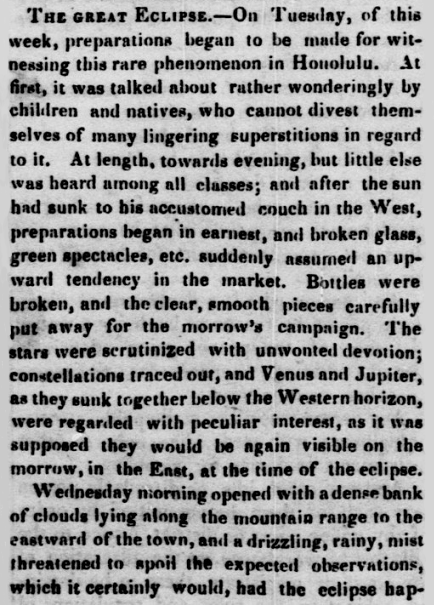THE GREAT ECLIPSE.—On Tuesday, of this week, preparations began to be made for witnessing this rare phenomenon in Honolulu. At first, it was talked about rather wonderingly by children and natives, who cannot divest themselves of many lingering superstitions in regard to it. At length, towards evening, but little else was heard among all classes; and after the sun had sunk to his accustomed couch in the West, preparations began in earnest, and broken glass, green spectacles, etc. suddenly assumed an upward tendency in the market. Bottles were broken, and the clear, smooth pieces carefully put away for the morrow's campaign. The stars were scrutinized with unwonted devotion; constellations traced out, and Venus and Jupiter, as they sunk together below the Western horizon, were regarded with peculiar interest, as it was supposed they would be again visible on the morrow, in the East, at the time of the eclipse.
Wednesday morning opened with a dense bank of clouds lying along the mountain range to the eastward of the town, and a drizzling, rainy, mist threatened to spoil the expected observations, which it certainly would, had the eclipse happened before eight o'clock. But towards nine, the sun rose above it, and the fleecy clouds began to fly off before his approach, occasionally obscuring his glory, and thrusting themselves before him, with peculiar obtrusiveness. Anxieties and doubts were felt and expressed in regard to the critical moments when, only, the grand phenomenon could be witnessed; and when the morning breeze set in, and drove up the clouds in the wake of the sun, it began to be a matter of perplexing uncertainty whether, after all, the cup of enjoyment was not to be dashed, just as it was raised to the eager lips. But soon all doubts were removed, and the sun rose triumphantly and unobscured above the clouds, and at the expected moment the eclipse commenced, and a most splendid sight it was.—Gliding up noiselessly, but with an unerring motion, the sun passed behind the moon, and in 79 minutes was totally eclipsed. As the obscurity increased, the light became dim, and a feeling of awe seemed to pervade the minds of all.—Objects near and at a distance, stood out with a marvelous distinctness; and when the last ray was obstructed, a shout rose from the multitude of spectators, which made the welkin ring.
For 16 minutes before and after the eclipse was total, Venus became visible; and for seven minutes Jupiter glimmered in the twilight, close by her side. During the total obscuration, ten stars, in different parts of the heavens, shone out distinctly, but were all quickly lost, when the rays of the sun were again released. The light was greater at the darkest period, than the brightest moonlight, and the outline of the Waianae mountains, 25 miles distant, could be distinctly seen. The shops were lighted for a few moments, but the interest in the eclipse was so universal and intense, that we doubt if much was bought and sold during the six minutes the total eclipse lasted.
Nothing could be more satisfactory than this opportunity to observe a phenomenon so rarely witnessed. Not a cloud intervened, to obstruct the vision in Honolulu; but while the atmosphere was clear in town, we noticed frequently the shadow of a dense cloud passing over the valley of Nuuanu, where many were noting the progress of the eclipse.
During the total eclipse, the air was chilly, like that of a cool, damp evening, but this state of the atmosphere soon changed upon the reappearance of the sun.
We conclude by alluding to the superstition of the nation on the subject of eclipses. From time immemorial they have associated an eclipse, of either the sun or the moon, with the death of their chiefs, and readily allude to them as having happened in conjunction. In regard to the one above noticed, they are not entirely free from their old opinions; though the better informed freely admit that they have no connection in reality. We are happy to know that considerable extra influence has been employed to explain the reason of eclipses, and that they could be calculated with certainty for periods in the future, exceeding the life-time of the oldest men. These explanations have had a beneficial effect in eradicating the superstition of many, but others are still faithless. Even but the day before the eclipse a native told us he was utterly faithless in regard to its occurring at all, and did not believe such things could possibly be mathematically demonstrated. We have not seen him since, but it would have afforded us much satisfaction could we have known the operations of his mind as the eclipse commenced, progressed and passed off precisely as he was told it would, but which he had no faith in. We hope this demonstration of the precision of science in calculating eclipses, and the perfection with which the works of the Creator are conducted, will tend to establish in the minds of the doubting natives the superiority of knowledge over ignorance, and to elevate their ideas of the character of that God whose attributes are, on occasions like the one noticed above, so clearly revealed to the universe.
(Any information about eclipse viewing procedures provided in historical articles should be considered unsafe)

